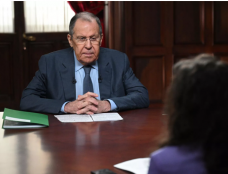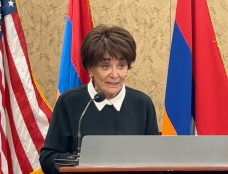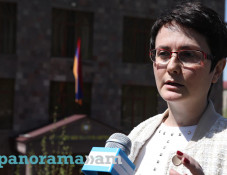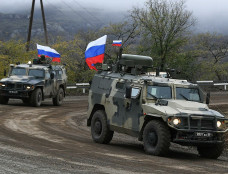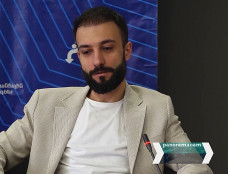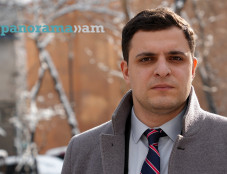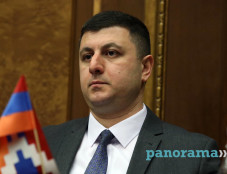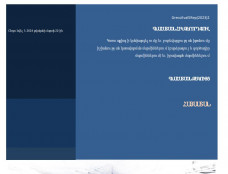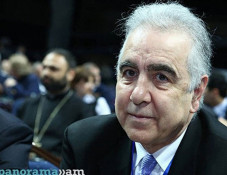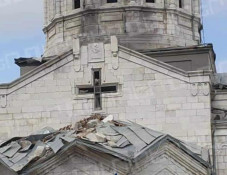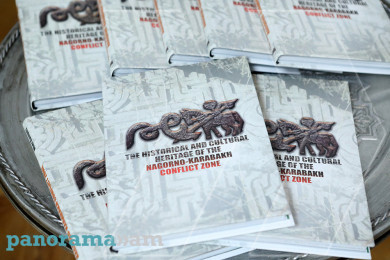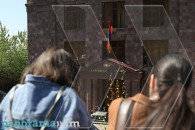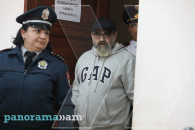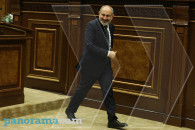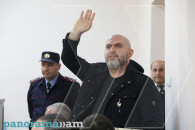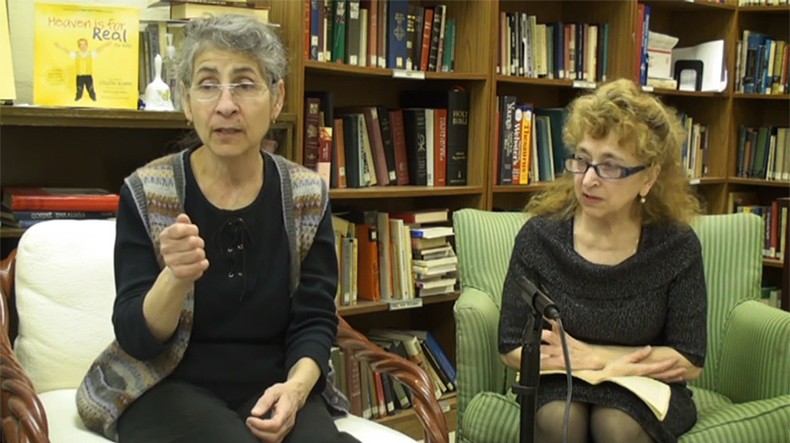
26 years after genocide in Baku: “They called and threatened to finish off with us as they had done with our niece in Sumgait”
Panorama.am has already reported that a collection book Baku Tragedy: Eyewitness Accounts is to be published in the frameworks of the project Ordinary Genocide. It will include the interviews of about 50 refugees currently living in the US who speak about their memories. ‘A Century-Long Genocide. Black January of Baku , a film, whose presentation took place a year ago, was made based on those accounts.
To commemorate the 26th anniversary of the genocide of the Armenians in Baku, Panorama.am goes on publishing chapters from the future book, provided to the website by Marina Grigoryan, the manager of the project an Ordinary Genocide.
Marietta SOGHOMONOVA. Worked at the Republican Hospital, Baku
Zhanna KASPAROVA (sister). Both lived in flat 30, 34 Sharifzadeh St., Baku
Marietta:
I left Baku in 1988. In the Republican Hospital, where I worked, there was talk all the time that something was coming up. In summer, I went on a holiday to Moscow and took my daughter with me. When I wanted to go back, my husband called me and said, “Marietta, you shouldn’t come here.” But the Sumgait events had happened before that, and we were very strongly affected by that as they directly touched our family – our niece Lola Avakyan had been murdered there in a cruellest manner.
The neighbours later told us what had been done to her. She was pregnant, but they had raped her and cut into pieces, they had put out cigarettes on her… We went to the Baku morgue several times for identification of the corpse, but we couldn’t find her. When we went there yet another time, we were told that three more bodies, one woman and two men, would be brought the next day and that if she were not among them, it would mean she was alive and concealed, hidden somewhere.
Zhanna:
Her mother, our cousin Greta, was at our place on those very days. She worked in Sumgait and arrived every Friday to spend the weekend with us, and went back again on Monday mornings. She worked as a teacher in the primary grades there. She and her husband seemed to be standing at the origins of Sumgait.
I went to work on 29 February. It was Monday, an average Monday… I was a teacher, too, and as soon as I reached to school, I was told, “Zhanna Mikhaylovna, someone’s calling you, it is urgent.” I wasn’t usually called on the phone at school. I went up, took the receiver and heard mom speaking in tears, “Zhanna, come home, quick, a massacre has begun.” I couldn’t understand what it meant, ‘a massacre,’ where, why, who? Mom continued, “Zhanna, we have just received a call from Sumgait. Greta has gone there. There’s no transport, she somehow could get cars on the road!” She rushed home because her only daughter Lola, who had grown up in front of our eyes, lived with her husband and his family in the city centre, where the most terrible events happened. When Greta at last+ entered Sumgait, she was stopped and told, “Leave as fast as you can while you are alive, because something unbearable is going on there.” She merely wasn’t let into the city, and she had to come back to Baku to us in the same way.
I went home… Greta was in an awful state. She was strongly distressed. She literally lost her ability to speak, she was already aware that something awful was on there. There was no communication with Sumgait, and the only thing we could do was to sit and wait. By the way, our brother Valery Grigoryan was a popular person in Baku. He had taught at militia school of the Ministry of Internal Affairs and was respected in the whole republic. He tried to do something, to learn something, but couldn’t. So, we were all sitting together, shaking from horror because we remembered the stories of our aunt, our mom’s elder sister. They used to live in Van, and her family had suffered very strongly during the Genocide. My aunt was a child back then but she clearly remembered everything that had happened. The whole thing as if had been programmed and fixed in her head because it was impossible to forget it. And aunt said that everything was now repeating in their children’s fate… We themselves realised after Sumgait that this very Turkish policy directed precisely against the Armenians was purposefully continuing.
So, we sat in stupor, waiting… The first reports started to come at last, and someone told us, citing the neighbours, that a young woman had been taken along the street, but no name was mentioned. They said her entire body was red, and the neighbours had first thought that she was wearing a red dress, but then they saw that the woman was bleeding. They made her sing, dance, they put out lit cigarettes on her body, and then several people raped her. But I think she had been irresponsive by then, and thanks God, because they mocked her inhumanly. A human being cannot commit such a thing. It is just impossible to think that a normal person can mock at a person like that, to torture a woman like that. They had cut off her breast, her female organs, they had cut out pieces of meat of her knees, gouged out her eyes, cut off the nose, ears… And only five days later, after calling all Baku morgues, we were told in one of them that they had received several corpses, a woman among them.
Marietta:
We were looking for her in the morgues, in the hospitals… I honestly confess it – if we did that ourselves, it would end very badly for us. But my husband had good Azerbaijani friends who helped us. They even apologised us that it had all turned out like that. If I went for identification to the morgue myself, I would have certainly died right there of horror. Her cousin recognised her. First, he wasn’t able to, because Lola’s body was unrecognisably mutilated. But then he recognised her with the little toe and with her hair – she used to have thick curly hair…
And here, when this happened to our niece, I told my husband I couldn’t stand it all and that we should leave. I took a holiday and went to Moscow. It was where I head that America was taking Baku Armenians. I went to the American Embassy and submitted the documents for the departure. Next, I wanted to go back as my husband and son were remaining in Baku. But my husband said I didn’t have to go back, he was also leaving the city with our son Emil and his parents because it was already impossible to live there.
Zhanna:
And we were remaining in Baku because, first of all, our dad was paralysed. He was a Great Patriotic War disabled. He had been wounded in Kerch and lost his leg, then the paralysis. As a result, he had been confined to bed for 12 years. Thanks God he didn’t understand what was going on at all. Otherwise, he would certainly wonder, “Is THIS what I fought for?” We didn’t tell him anything and hid what was going on. So we could neither leave him, nor take him with us.
We lived in a constant fear. It is too hard to describe that. Awful things were happening in the city. We constantly received calls, even at night. They threatened us, they said, “So you haven’t leaved yet? Wait! We will come and finish off with you like we did with your niece who died in Sumgait.” So, they knew everything, and they knew about Lola, too, you see? I’ve been suffering from chronic insomnia since that…
Our dad died in 1989, at night. When he passed away, we sat in silence only crying quietly. We didn’t know what to do or how to bury him. We tried not to make noise, as we understood that it was dangerous. We didn’t know how to act. In the morning, the neighbours apparently felt something and knocked at our door. They said they had heard sounds of crying at night. No matter how hard we tried to cry quietly, they could hear it. We explained them what had happened. They said, “Why didn’t you tell us? Haven’t we been neighbours for so many years?” People of different nationalities – Jews, Azerbaijanis, Russians, and they deserve credit – lived near us and they all were worried for us because we had lived side by side for so many years and had been very close and good neighbours. We used to have an adjoining wall with an Azerbaijani family, and they said, “We won’t change a hair of yours with an Azerbaijani.” They told me on that day, “Zhanna, next time anyone appears, don’t shout, don’t cry, just come to us quietly. We’ll hide you in our cellar.”
In any case, we buried our father, well, very modestly, and could put up a modest memorial on his grave. Valera, our brother, helped us. He worked in the system of the Internal Ministry and his friends organised it all. They helped that he funeral be quiet, without any excess. But after that, we still remained in Baku though Valera insisted that we should leave because there was an imminent danger any moment. Mom said we had no place to go. He answered that it was better to live in a station than to be killed. But mom just waited for Valera to be able to come with us because men especially faced a particular threat. They were especially hated and killed in mass. If there could be some concessions for the women, the Armenian men could hope for nothing. That is why mom told my brother that he was the one who needed to leave first.
Once mom got on a trolleybus and some teenagers got to her. They used to walk in the streets in groups, get on the transport, check passports. If someone failed to show them a passport, that was all, it meant he was an Armenian. They checked mom’s passport and saw that she was Armenian. They started to shout and threaten. Scared, she jumped out of the trolleybus, rushed along the street and ran into a yard, where she was calmed down, helped… Meanwhile, we waited, waited, but mom wouldn’t come. We already started to worry thinking that something might have happened. And then she suddenly called from the flat of those people who had helped her. It was necessary to go and take het home. But who could go? The situation in the city was terrible, it was very dangerous to walk in the street, they were checking passports everywhere. Those who checked were teenagers, they smoked and were drunk, I don’t even know what to call them. A ragtag that was given something to drink, smoke, given arms and ordered to do something.
On one occasion, we were near to be killed at night. My sister, who had three sons – the eldest was six, I think – had moved to our place by that time because I was left alone. We always sat dressed, ready to flee at any moment. Every evening, especially at nights, we looked from behind the curtains, watched who entered the doorway, and what to expect. Our flat had been already attacked before. For instance, once they burnt the door. Somewhere around half past eleven at night, my 6-year-old nephew noticed that the door was on fire. At first, I didn’t believe to him, but then I went to the corridor and saw our door completely in flames. I tried to open the door though mom shouted to me not to do that, as it was not clear what to expect behind the door. We started to put out the fire with water. The neighbours were alarmed and called us to their place on the next night. Then everything seemed to calm down, though we constantly received calls with threats.
My younger sister’s close friend called her that night and said, “Zhanna, pack your things as soon as possible and run away because something unimaginable is going on in Kirovabad. Quick, quick, quick!” It was in late 1988, in November. I was startled, but where could we run away? Really nowhere. I went out to the balcony on the other side and thought that in case of running away, we were to go to our neighbours, who had offered their help. And here, we saw a car stop. We immediately began to shake. Three men got out, entered our doorway and knocked at our door. We had already taken the children out to the balcony on the other side and waited what would happen next to understand how to act. My sister’s husband, Sasha, was Russian and he saved us because he perfectly spoke Azerbaijani. If not for him, we wouldn’t possibly be here, either.
So, Sasha opened the door and talked to them through the chink in a very rich Azerbaijani. Surprised, they said Armenians were supposed to live here in this address (they had address lists). Sasha answered them, “We have bought this flat from the Armenians long ago.” That is, he spoke to them in such a pure Azerbaijani that they didn’t even think that it could be an Armenian family. Meanwhile, we were all shaking there because if they talked to us or looked at us, they would understand who we were. This is how we were saved that day…
Marietta:
When we already lived in a hotel in Moscow, we learnt about our uncle’s death in Baku. We still don’t know how he was killed. We filed an inquiry to search him. I remember mom go to the ministry. She was told there that her brother had been hung at his home. He had survived the entire war. His name was Garun Grigorevich Kasparov.
Zhanna:
Uncle Garo’s leg was wounded during the war, and the Germans, the Fascists, mercied him and let him go, they didn’t take him hostage. He always told us about that. The wound remained on him his whole life. He lived by himself, his wife had passed away. We never knew the details of his murder.
Marietta:
We know nothing about my father’s grave. The cemetery in Montino is said to have been demolished and the memorials broken. There was a very rich Armenian cemetery over there, and we were told a road had been paved with the marble headstones.
Nashville, Tennessee, US. 22.03.2014
A mass pogrom of Armenian population was committed in Baku from 13 to 19 January 1990 as a culmination of the genocide of the Armenians in Azerbaijan unfolded between 1988 and 1990. After the Sumgait pogroms (26-29 February 1988), persecutions, beatings, particularly cruel killings, public mockeries, pogroms of separate flats, seizure of property, forcible expulsions and illegal dismissals of Armenians started in Baku. Only some 35 or 40 thousand Armenians of the community of 250 thousand remained in Baku by January 1990; they were mainly disabled people, old and sick people and the relatives looking after them. The pogroms took an organised, targeted and mass nature since 13 January 1990. A large amount of evidence exists about the atrocities and killings committed with exceptional cruelty, including gang rapes, burnings of people alive, throwing people out of balconies of higher floors, dismemberments and beheadings.
The exact number of the victims of the genocide of the Armenians in Baku still remains unknown. According to different sources, between 150 and 400 people were murdered, and hundreds were left disabled. The pogroms went on for a week amid a total inaction of the authorities of Azerbaijan and the USSR, as well as the internal troops and the large Baku garrison of the Soviet Army. Those who managed to avoid death were forced into deportation. The Soviet troops were deployed to set order in Baku only on 20 January 1990.
For more detail, visit KarabakhRecords .
Related news
- 26 years after genocide in Baku: “Baku received order from Moscow not to intervene in pogroms and allow them easily slaughter Armenians”
- 26 years after genocide in Baku: “They marked Armenian flats with crosses to come and attack later”
- 26 years after genocide in Baku: “My mom listened to Sayat-Nova and cried – her father survived Genocide, then she herself became refugee”
- 26 years after genocide in Baku: “They just threw that young Armenian under train”
- 26 years after genocide in Baku: “Someone informed pogromers that young Armenian woman hid in that house, and they came after me…”
- ‘History repeats itself…’ ‘A Century-Long Genocide. Black January of Baku’ film screened in Richmond
Newsfeed
Videos





